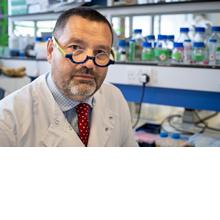New ADAM33 study to find underlying causes of asthma
SUHT%202008%20copy.tif_SIA_JPG_fit_to_width_INLINE.jpg)
Researchers at the University of Southampton are to begin a new study investigating the underlying causes of asthma.
With a £64,559 J Moulton (2018) grant from the British Medical Association the study will test how the asthma gene, ADAM33 (A Disintegrin and Metalloproteinase 33), changes the underlying immune cell microenvironment in the lungs to promote allergic airway disease.
ADAM33 is a gene known to be associated with asthma, twitchiness of the airways and decline in lung function in children and adults.
Previous studies led by Professor Hans Michael Haitchi, Associate Professor in Respiratory Medicine, have discovered that ADAM33 causes airway remodelling resulting in more muscle and blood vessels around the airways.
ADAM33 makes an enzyme that is normally attached to cells in the airway muscle. In people with asthma the ADAM33 enzyme loses its anchor to the cell surface and is released into the lung. It is believed that the release of ADAM33 from the cell surface plays an important role in causing poorer lung function. Work from the group suggests that if ADAM33 is switched off or prevented from being released, the features of asthma will be reduced (ER Davies et al, JCI Insight 2016).
The new grant has been awarded to Professor Haitchi, alongside Donna E Davies, Professor in Respiratory Cell and Molecular Biology and Joanne Kelly.
Professor Haitchi said: “Our previous pre-clinical studies have shown that ADAM33 causes airway remodelling resulting in more muscle and blood vessels around the airways but it did not cause inflammation. However, when small amounts of a common human aeroallergen (house dust mite) were introduced into the lungs, both, airway remodelling and allergic airway inflammation were enhanced.
“Therefore, we now wish to test if this untethered form of human ADAM33 not only induces airway remodelling but also changes the underlying immune cell microenvironment in the airways, which promotes allergic airway disease and asthma. Blocking ADAM33 protein has potential to become a new treatment for asthma.”
